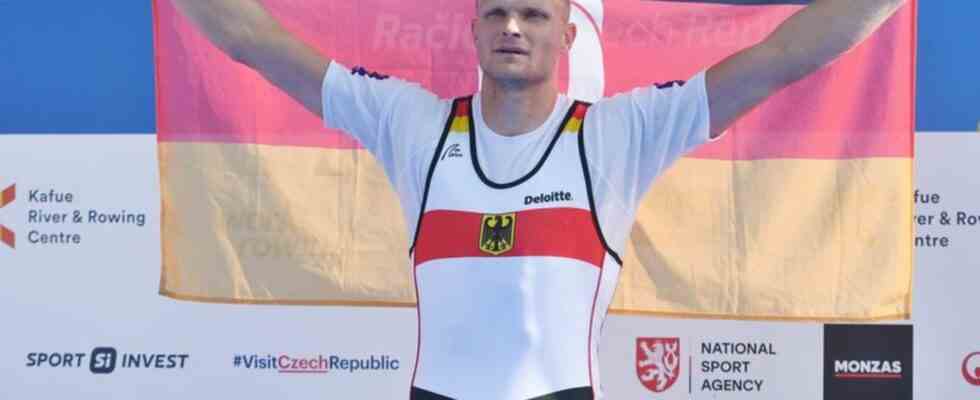Title race in the Czech Republic
Rower Zeidler improves gloomy German World Cup balance
Oliver Zeidler rowed to gold in the Czech Republic. photo
© Š Astný Jan/CTK/dpa
What a final. With a tour de force across the Racice regatta course, Oliver Zeidler prevented the German rowing fleet from going completely empty-handed in the Olympic classes at the World Championships.
Bad overture, celebrated final chord – Oliver Zeidler gave the German Rowing Association the longed-for gold on the last day of a historically weak Rowing World Championships.
In the one-final of the title fights in Racice (Czech Republic), the 2019 world champion relegated the favored European champion Melvin Twellaar from the Netherlands and the British Graeme Thomas to second and third place. “I’ve been waiting for this sense of achievement for a long time. It boosts my self-confidence,” commented Zeidler on his impressive start-finish victory. “When you win a regatta like this, you can give yourself a pat on the back.”
Unlike the disappointing fourth place at the home European Championships in Munich six weeks ago, the courageous tactics of the 26-year-old paid off this time. In the final sprint he showed stamina and crossed the finish line half a boat length ahead. In the end, even the strength to celebrate was missing. Only at the award ceremony did the 2.03 tall model athlete smile again. Zeidler posed for the photographers on the shoulders of his two opponents.
He was proud that his father Heino Zeidler was able to achieve success beyond most association measures: “We have confirmed that my father and I are doing great work at a non-federal base. My father, as a non-federal coach, shows everyone how it is done right.”
Alarming development at DRV
However, Zeidler’s courageous appearance cannot hide the questionable development of the DRV. Except for the singles and the women’s double sculls, which finished sixth, the world’s largest rowing association was not represented in any of the 14 finals of the Olympic classes. This had never happened since the World Cup was introduced in 1962.
Even the Germany eight, who have been successful for years, missed the final of a season highlight for the first time since Beijing 2008, but still won the B final on Sunday ahead of China. “Overall, we’re far from being among the best in the world. We have to start working really hard now,” commented coach Uwe Bender. Like the eighth, Alexandra Föster from Meschede, third at the European Championships, finished the regatta in seventh place after winning the B final.
A quick turnaround is needed. After all, there is not much time left until the allocation of the Olympic starting places at the World Championships next year in Belgrade. Brigitte Bielig is optimistic that the German rowers will be able to catch up with the world leaders again by then. “We are in a process of upheaval with many young athletes. I see potential in all areas,” said the DRV head coach of the German Press Agency.
External agency should find a way out of the crisis
But the association management does not want to rely on this assessment alone. As announced during the World Cup, an external agency is to be commissioned with finding ways out of the crisis and not – as originally planned – an internal expert council of the association.
Bielig can live with this decision, but referred to the first reforms that have already been initiated: “We changed so much this year with the sports director. But of course it has to take effect first.” She hopes for greater transparency: “I don’t think we’re that wrong with our structures. They only have to be recognized in rowing Germany. If the caller doesn’t apply in your own country, an external one has to do it.”
Above all, Bielig wishes for more peace and quiet. “I think we’re on the right track, but we just have to persevere and not always get disruptive fire from left and right, which makes work considerably more difficult,” she said, referring to the sometimes clear criticism of athletes of the association’s leadership. She added resolutely: “We have to give the athletes target orientations, communicate with them, but we also have to make demands.”

